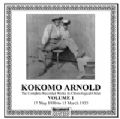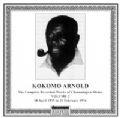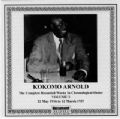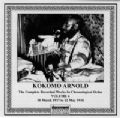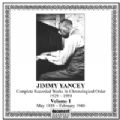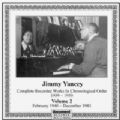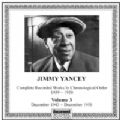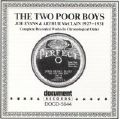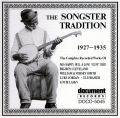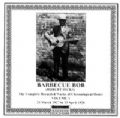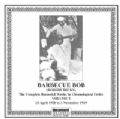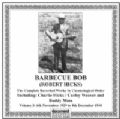"Document 5000 Series "
Viewing 37 to 48 of 700
|
Kokomo Arnold Vol 1 1930 - 1935 Kokomo Arnold, bottleneck-slide guitar, vocal.
Genres; “Country” Blues, Georgia Blues, Early Chicago Blues, Bottlenck-slide Guitar. Informative booklet notes by Keith Briggs. Detailed discography.
Putting a bottleneck onto the little finger of the fretting hand and ‘sliding’ it up and down the strings of a guitar to produce a spine-chilling and almost vocal sound is a trick employed by many blues players. From Bukka White to Joe Louis Walker, many blues players have made startling use of the style, two of the most famous being Elmore James and James Kokomo Arnold. Kokomo, often placing his guitar in his lap Hawaiian-style and ran a glass across the strings. He was left-handed and had a somewhat erratic sense of time - but he was probably the fastest bottleneck guitarist ever to record. Continued... More Info on our New Store >> |
||
|
Kokomo Arnold Vol 2 1935 - 1936 Kokomo Arnold Vol 2 1935 - 1936 Kokomo Arnold, vocal, bottleneck-slide guitar. Genres: Country Blues, Country Blues guitar, bottleneck-slide-guitar, Georgia blues, Chicago blues. Informative booklet notes by Keith Briggs. Detailed discography By 1935 Kokomo Arnold was firmly ensconced in Chicago. He was still a country boy to many of his associates but, never an unworldly man; he was quickly getting wise to the big city and its ways. Despite his dedication to his basement bootlegging business and a strong desire to "go fishing instead" he had become a fixture on the local entertainment scene, working beside most of the big names in the blues at that time. More Info on our New Store >> |
||
|
Kokomo Arnold Vol 3 1936 - 1937 Kokomo Arnold Vol 3: 22nd May 1936 to March 12th 1937 Kokomo Arnold, vocal steel, bottleneck-slide guitar’
With contributions by; Alice Moore vocal, Signifying Mary Johnson, vocal; Lovin’ Sam Theard, vocal; Roosevelt Sykes, piano; Albert Ammons, piano, Peetie Wheatstraw, piano and others...
Georgia blues , Chicago blues, Bottleneck-slide guitar. Informative booklet notes by Keith Briggs Detailed Discography
James “Kokomo” Arnold was born in Georgia on September 15, 1901, and began his musical career in Buffalo, New York in the early '20s. During prohibition, he worked primarily as a bootlegger, and performing music was a only sideline to him. Nonetheless, he worked out a distinctive style of bottleneck slide guitar and blues singing that set him apart from his contemporaries. Continued...
More Info on our New Store >> |
||
|
Kokomo Arnold Vol 4 1937 - 1938 Kokomo Arnold, vocal, slide guitar. With contributions by Peetie Wheatstraw, piano, and others... Genres: Country Blues, Country Blues guitar, bottleneck-slide-guitar, Georgia blues, Chicago blues. At the time that the first records appearing on this CD were made, March 1937, Kokomo Arnold had been with Decca for two and a half years and his relationship with Mayo Williams was deteriorating. It was all to end in the following year when Kokomo decided that Williams was not dealing fairly with him and broke away from recording altogether. He had never been a committed bluesman anyway, having he felt, many other rows to hoe. Not that you would have guessed that from the quality of the recordings that he made during his last sessions; from the contemporary blues reportage of Mean Old Twister through to his final, aptly named, display piece Something’s Hot he maintained an enviable level of excellence enlivened here and there by the odd flash of brilliance. Maybe it was a reflection of his clash with Williams that many of his recordings from this period remained unissued - or maybe it was part of its cause. More Info on our New Store >> |
||
|
Jimmy Yancey Vol 1 1939 - 1940 Jimmy Yancey piano solos.
Also, two tracks by vocalist Faber Smith, accompanied by Jimmy Yancey.
Genres: Blues piano, Boogie-woogie piano.
Informative booklet notes by Konrad Nowakowski
Detailed Discography.
“Veteran...Jim Yancey, whose dancing thrilled the King and Queen of England in 1913, still is active. Jim taught Meade Lux Lewis and Albert Ammons some of his tricks, but went unrecorded until a few months ago when Solo Art waxed his blues. Today Yancey is a grounds keeper for the Sox.” More Info on our New Store >> |
||
|
Jimmy Yancey Vol 2: 1940 - 1943 Jimmy Yancey, piano solos, vocal.
Also, one track with Estella “Mama” Yancey, vocal, accompanied by Jimmy Yancey on harmonium.
Genres: Blues piano. Boogie-woogie piano.
Informative booklet notes by Konrad Nowakowski
Detailed Discography.
Some have spoken of Yancey as “blues singer of the most touching accents” (Rudi Blesh) and in similar terms. Yancey’s few vocals, originally released on three different labels, are among the items on this CD. Continued... More Info on our New Store >> |
||
|
Jimmy Yancey Vol 3: 1943 - 1950 Jimmy Yancey, piano, harmonium. Genres: Country Blues, Blues Piano, Ragtime Piano. “Everybody liked it when Yancey was playing ‘cause it seems like you could come into a place where he was and the whole house would be jumping. Everybody was up there clapping or beating their hands or beating their feet, keeping up time with him. I’m telling you, brother, it wasn’t nothing short by him. He had them going.” Meade Lux Lewis. Continued... More Info on our New Store >> |
||
|
The Two Poor Boys 1927 - 1931 Joe Evans, vocal, kazoo, guitar; Arthur McClain, kazoo, guitar. Genres: Country Blues, Country Blues guitar, Tennessee Blues. Country Blues Duet. Joe Evans and Arthur McClain are reported to have come from Fairmount, in eastern Tennessee, a region where blacks were outnumbered twelve to one by whites, and this goes some way to explaining the evident hillbilly influences on their music. Otherwise, all we know about “The Two Poor Boys” is in the grooves of their 78s. Continued... More Info on our New Store >> |
||
|
The Songster Tradition 1927 - 1935 (See DOCD-5678) THIS CD IS NOW PERMANENTLY OUT OF STOCK. IT IS NOW AVAILABLE AS DISC 1 OF A 3-CD BOX SET; DOCD-5678. THE BOX SET ALSO INCLUDES DOCD-5045 AND DISC 3 HAS TRACKS BY CEDAR CREEK SHEIK, ROBERT HILL AND VIRGIL CHILDERS AND OTHERS. More Info on our New Store >> |
||
|
Barbecue Bob Vol 1 1927 - 1928 Robert Hicks "Barbecue Bob", vocal, twelve-string guitar.
Genres; Country Blues, Atlanta Blues, Twelve-String Guitar, Bottleneck-slide Guitar. Informative booklet notes by Chris Smith. Detailed discography.
Robert Hicks was an extrovert young man of 24 when Columbia's Dan Hornsby arranged his first recording session in March 1927, and had only moved into Atlanta from the countryside a few years before. When he recorded He had learned guitar, along with their friend Curley Weaver, from Curley's mother; all three played in a similar style, favouring the big, booming sound of the 12-string guitar, and relishing the contrast of pulsing bass riffs with the whine of a bottleneck on the treble strings. Barbecue Blues was a good seller, but it was at his second session, in New York in June 1927, that Bob firmly established himself with black record buyers, and thus with Columbia; Mississippi Heavy Water Blues, inspired by the catastrophic floods that had occurred that very month, was a considerable seller, and as a result Robert became Atlanta's most-recorded blues singer of the 20s. It was probably his success that persuaded Columbia to record both his brother Charlie and, in 1928, Curley Weaver. Continued... More Info on our New Store >> |
||
|
Barbecue Bob Vol 2 1928 - 1929 Barbecue Bob (Robert Hicks), vocal, twelve-string guitar
Nellie Florence, vocal; accompanied by Barbecue Bob, twelve-string guitar (two tracks)
Genre: Country blues from Atlanta, Georgia. Informative booklet notes written by Chris Smith. Detailed discography.
Think of the "rural blues" or "country blues" from Atlanta in the late 1920s and it is more than likely that the sound of the iconic twelve-string guitar comes to mind. One of the undisputable "Kings of the twelve-string" from the Atlanta area was Blind McTell (see Documents BDCD-6001, BDCD-6014 and the triple CD; DOCD-5677), yet, if there was such a thing as the guitar sound of Atlanta at the time, it was that of Robert Hicks, better known as Barbecue Bob and his brother Charlie also known as Laughing Charlie (see Document BDCD-6027).
Though Bob's guitar technique didn't have the same complexities and range as that of Willie Mctell, it was powerful, with the use of a hard, slapping, of the lower bass string, contrasted with the high ringing notes, produced, almost exclusively, on the high treble string. Usually, his accompaniments were delivered with a relentless, pulsating rhythm and this simple but winning formula was topped off by his dark, rich, captivating voice. More Info on our New Store >> |
||
|
Barbecue Bob Vol 3 1929 - 1930 Barbecue Bob (Robert Hicks), vocal, twelve-string guitar. Genres: Country Blues, Georgia Blues, Bottleneck-slide Guitar, Country Blues Harmonica. Columbia’s field recording trips to the South took place twice a year from 1925 to 1930, in the spring and the late fall; having collected eight songs (of which they issued six) from Barbecue Bob in November 1929, they returned as usual in April 1930. On this occasion, Bob’s brother Charlie Lincoln made his only recorded appearance under his real name on the comic dialogues Darktown Gamblin’, which were credited to Robert & Charlie Hicks. Barbecue Bob was still a hot property as far as Columbia were concerned... Continued... More Info on our New Store >> |
||

